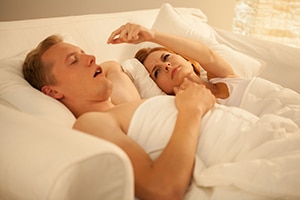What Is Sleep Apnoea?

There are two types of sleep apnoea: obstructive sleep apnoea and central sleep apnoea. In obstructive sleep apnoea, by far the most common kind, your airway collapses when you sleep and the muscles that hold your throat open relax. Men are more likely to suffer from this condition, especially if they are overweight, and the anatomy of the throat plays an important role.
In central sleep apnoea, your brain just stops telling your body to breathe. To resume breathing, your brain has to wake up and send the signal again.
It is possible to have both types simultaneously.
How to Know If You Have Sleep Apnoea
The only way to diagnose sleep apnoea is to have a health professional evaluate the results of a sleep test, which looks at your breathing, oxygen levels, and more.
But should you have a sleep test? If you have the following symptoms, you should get a sleep test to diagnose or eliminate sleep apnoea as a potential cause:
- Daytime fatigue
- Loss of focus, memory, or motivation
- Sudden onset of irritability, short temper, depression or other mood disorders
- Falling asleep when watching TV, reading, or performing sedentary tasks like driving
- An inability to lose weight despite dieting and exercise
- Diagnosis of high blood pressure, coronary artery disease, or some other conditions
- Snoring that stops in a choking or gurgling sound
These are common signs of sleep apnoea.
CPAP Sleep Apnoea Treatment and Its Alternatives
CPAP, continuous positive airway pressure, has long been the gold standard of sleep apnoea treatment. It can treat mild, moderate, and severe sleep apnoea, of all types. The only problem is CPAP can be loud, uncomfortable, and inconvenient to travel with. More than half of all CPAP users end up discontinuing their sleep apnoea treatment because they can’t tolerate CPAP. For these people, a CPAP alternative is critical.
Oral appliance therapy is a comfortable alternative for people who have tried and cannot tolerate CPAP machines for obstructive sleep apnoea. Oral appliance therapy works at night while you sleep, repositioning your jaw to help keep your airway open. It can treat mild to moderate sleep apnoea.
For some people, lifestyle modifications, such as losing weight and reducing the amount of alcohol you consume in the evening, may be enough to control sleep apnoea.
To learn which sleep apnoea treatment option is best in your case, please call (02) 9686 7375 or contact our Sydney-area office today for an appointment.

